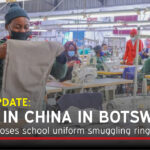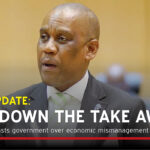Cities and towns experience rising rates
The latest figures from Statistics Botswana (SB) show that the annual inflation rate in April registered a slight increase.
Inflation for the month stood at 2.5 percent, up 0.3 percent from the 2.2 percent recorded in March.
However, SB stressed that data collection for the month was hampered by the on-going lockdown, enforced on 3 April.
The restriction on movement meant data collection for prices was primarily conducted through emails and telephone calls.
In the end, the data collected covered only 70 percent of goods in the Consumer Price Index (CPI) basket.
The most affected items in the basket were alcoholic beverages and tobacco – the sale of which is temporarily suspended – and clothing and footwear, as outlets were closed during the month of April.
The closure of such shops reportedly resulted in a number of missing or unobserved prices, which were imputed through variation of the observed prices.
According to SB, the biggest contributors to the April annual inflation rate were: housing, water, electricity, gas and other fuels, which went up by 1.1 percentage points, and food and non-alcoholic beverages, which increased by 0.4 percent.
By regions, the inflation rates between March and April indicates that cities and towns increased by 0.4 of a percentage point, rising from 2.3 percent to 2.7.
Rural villages’ rates rose from 2.0 percent to 2.3 percent while urban villages’ rates similarly registered an increase of 0.3 percentage point to 2.6 percent.
When addressing local media on Tuesday this week, the Competitions and Consumer Authority CEO, Tebelelo Pule said the Authority observed an increase in consumer good prices when the effects of Covid-19 started to be felt locally.
“Prices increased in an unusual manner which disturbed us as the Authority. On top of that, there was also a decrease in the quality of goods,” announced Pule, highlighting the example of sanitizers, which she noted were ‘manufactured by anybody’.
Pule revealed that the Authority went into shops around the country to compile a price list, which they published on their website and Facebook page to allow consumers to compare how different retail stores were pricing their goods.
The CEO cautioned that those found guilty of unfairly increasing prices face a possible five-year jail term or P100, 000 fine or even both.

















